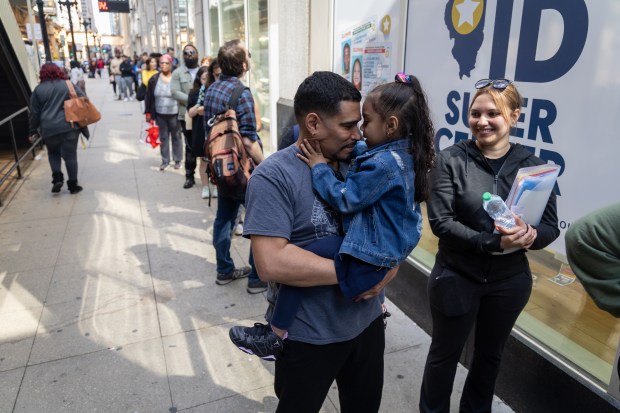Two decades after Congress passed the REAL ID Act in 2005, travelers will finally be asked for compliant IDs to board planes starting Wednesday. Travelers will still be able to fly without a REAL ID, officials said this week, but they may face extra scrutiny at the airport.
In Illinois, a last-minute surge in REAL ID-seekers left Secretary of State Alexi Giannoulias visibly irritated at a news conference Monday.
Giannoulias urged Illinois residents to not get a REAL ID immediately unless they must have one, saying Wednesday’s deadline “isn’t really a deadline.”
Illinois residents can still use other forms of identification to board a plane after May 7, such as a passport, and do not need a REAL ID to drive a vehicle or identify themselves, Giannoulias added.
The state issued more than 185,000 REAL IDs during April — 40,000 more than the month before, according to Giannoulias. Five days before the deadline, the state processed more REAL IDs than any other day, at more than 11,000. The surge made it difficult for many to access other DMV and secretary of state services, Giannoulias said Monday.
The state will continue expanded REAL ID services, including Saturday hours, and a REAL ID Supercenter in Chicago will remain open at least through the end of the month. The supercenter, at 191 N. Clark St., offers walk-in service.
Department of Homeland Security head Kristi Noem said Tuesday that domestic travelers without a REAL ID or passport will still be able to fly, for now. They “may be diverted to a different line, have an extra step” in security, she said.
Extra enforcement methods will vary by airport, according to TSA’s Great Lakes regional spokesperson Jessica Mayle.
Mayle said she wasn’t certain how long U.S. residents could continue flying without a REAL ID. Mayle considers the deadline the beginning of “full enforcement,” instead of any sort of phased transition.
“I don’t want anyone in the future to expect what’s happening now to be what happens forever,” Mayle said. “People need to get in compliance as quickly as they can.”
Temporary paper REAL IDs, issued while people wait for the hard copy of their ID cards, cannot be used alone to board flights, Mayle added. Another form of identification, such as a driver’s license, is required alongside the paper ID, and those passengers may still be subject to extra screening.
Giannoulias said that while some residents receive the hard copy of their ID in about a week, it usually takes two to three weeks. Lines to apply for the REAL ID have been long recently.
“To see these lines right outside our door here, it is probably the most frustrating thing I’ve ever seen in public life, because it does not have to be this way,” said Giannoulias. “Again, people have had over a decade to get this done.”
Giannoulias added that the Department of Homeland Security did not do “a great job of having a uniform process on this issue,” a sentiment he has expressed for months.
Yet reports of long lines and few available DMV appointments have led to some criticism of the secretary’s efforts. Giannoulias said Monday that he has done “everything but light himself on fire” in his quest to help Illinois residents become REAL ID compliant.
In March, his office opened the REAL ID Supercenter in Chicago’s Loop and added Saturday hours at 12 DMVs across the state to meet a growing demand for the document. The secretary of state’s website also added a portal with a checklist for people to ensure they need a REAL ID before seeing appointment availability.
The Chicago Department of Aviation said in a statement that it had “made significant efforts” to educate the public about the ID requirement, including via digital signs at O’Hare International Airport and Midway Airport and through social media posts.
Mayle said given the REAL ID surge at DMVs, she would not recommend rushing to get one, but the Transportation Security Administration expects travelers to face delays or extra screening at airports.
“It is a very, very busy time for them (the Illinois secretary of state’s office),” Mayle said. “We are going to try and process those travelers and get them through the checkpoint, but really recommend they give themselves extra time. … What TSA is most concerned about is that you bring something to the checkpoint that’s acceptable.”
The REAL ID Act was passed in 2005 on a recommendation from the 9/11 Commission. Implementation has been repeatedly delayed since.
Chicago Tribune’s Talia Soglin contributed.




